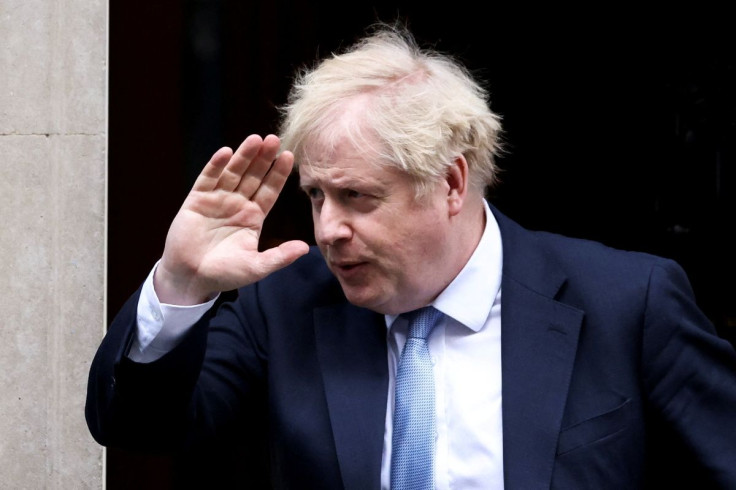Boris Johnson On Tough Mission To Woo India Away From Russia

Armed with sticks and carrots, a bevy of top U.S. officials trooped into New Delhi last month only to return empty-handed, however, now, it is the turn of UK Prime Minister Boris Johnson to woo India away from Russian influence - a tough task indeed.
Johnson's India visit, starting April 21, is not part of the business as usual trip because no business delegation is accompanying the premier this time as he has fewer interactions with the Indian business community.
The two-day trip, canceled twice due to the pandemic, is mostly packed with the high-priority political agenda of taking India away from the Russian sphere of influence.
As part of the bonhomie, Johnson's itinerary to the former British colony includes a visit to Gujarat, Indian Prime Minister Narendra Modi's home state. In India, Johnson will plead with New Delhi not to profit from the gap left by Western firms that are deserting Russia in the wake of removal from the SWIFT international trading platform due to the sweeping U.S.-led sanctions.
To make Johnson's India job difficult, India and Russia have hinted at putting in place a ruble-rupee mechanism to bypass the international trading platform SWIFT from which Russia was removed following the Ukraine invasion.
Though India proudly boasts of its status as a close ally of Washington, the Russian influence, dating back to the Soviet era, still lingers on. India's nuclear submarines are mainly based on Russian technology so also its aircraft carriers, tanks, rifles, and combat aircraft.
India considers Russia as its all-weather friend and Moscow has shown willingness to sell advanced defense equipment that Western nations have been unwilling. Russians have also proved large at heart with India when it comes to access to their defense know-how which is not the case with U.S.-led western nations.
Though India buys arms from U.S., France, Israel, and Australia, Russia lords over the Indian defense sector with nearly 50 percent contributions currently. Earlier, it was more than 80 percent. Johnson will have to put his best foot forward to convince India to make a change of heart.
Next, Johnson may ask India to acquire less Russian fossil fuels as the U.S., UK, and European Union are collaborating to undermine the Russian status as the second-largest global energy supplier so that Russia is short of money to fund its ongoing Russian invasion.
An energy-hungry India, however, has defied the western diktat and opted for its historical ally's oil. India's strategic security partner further placated New Delhi by offering its oil at a highly discounted price while the global energy market is heading towards the south.
Keeping its energy security in mind, New Delhi found the Russian offer too big to give a slip and placed an order for at least 13 million barrels of oil since the Ukraine invasion on Feb. 24, according to Reuters.
The figure is just 3 million barrels short of the 16 million barrels India bought from Russia throughout 2021. Will Johnson succeed in dramatically placing India with the West against Russia? A mission where, top U.S. officials, including the key architect of Washington's punitive sanctions against Russia, Daleep Singh, failed miserably last month and ended in a war of words between New Delhi and the U.S. administration.
India is aspiring for regional superpower status. Of course, the U.S. plays a vital role in this economic transition. However, staying away from the Russian camp will further cement the ties between China and Russia against India. With their economical clout, both Russia and China can tilt the balance in their favor and can marginalize India in the most populated continent. Will India, which has genuine fears that joining hands with the west to isolate Russia may boomerang, listen to Johnson?
Russia has always come to the rescue of India at the U.N. and at other global fora, a practice started with the Soviet Union. Will India fall with Johnson at the cost of assured Russian global support?
Most importantly, Pakistan, during the premiership of Imran Khan, was making strenuous efforts to enter into the good books of Russia. Aided by China, Moscow already rolled out a red carpet for Pakistan. With Islamabad on the Russian side, a nuclear troika comprising Pakistan, India's arch-rival, and China with whom it has fought two wars, loomed large. Though this threat perception has subdued after a pro-U.S. government coming in place of Imran Khan, the Pakistan factor matters for India and it is good for 57-year-old Johnson to know it better.
Apart from this Russian mission, Johnson's India visit is packed with bilateral engagements as Britain is trying to be more active in international trade post-Brexit. An economically growing India, however, fits the bill for bilateral trade and Johnson's scheme of things.





